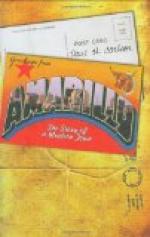Discoursing in this fashion, with digressions to Harry in regard to the machines, the furniture, and the sales, that showed Mrs. Carriswood that he meant to keep an eye on his twenty odd thousand dollars, he strolled at her side. To Miss Van Harlem he scarcely said three words. In fact, he said exactly three words, uttered as Miss Margaret’s silken skirts swung too near a pot of varnish. They were “Look out, miss!” and at the same second, Tommy (who was in advance, with really no call to know of the danger), turned on his heel and whisked the skirts away, turning back to pick up the sentence he had dropped.
Tommy told Harry that Miss Van Harlem was a very handsome lady, but haughty-looking. Then he talked for half an hour about the cleverness of Mrs. Carriswood.
“I am inclined to think Tommy will rise.” (Mrs. Carriswood was describing the interview to her cousin, the next day.) “What do you think he said to me last of all? ‘How,’ said he, ’does a man, a gentleman’—it had a touch of the pathetic, don’t you know, the little hesitation he made on the word—’how does he show his gratitude to a lady who has done him a great service?’ ‘Young or old?’ I said. ‘Oh, a married lady,’ he said, ‘very much admired, who has been everywhere.’ Wasn’t that clever of him? I told him that a man usually sent a few flowers. You saw the basket to-day—evidently regardless of expense. And fancy, there was a card, a card with a gilt edge and his name written on it.”
“The card was his mother’s. She has visiting cards, now, and pays visits once a year in a livery carriage. Poor Mrs. Fitzmaurice, she is always so scared; and she is such a good soul! Tommy is very good to her.”
“How about the father? Does he still keep that ‘nice’ saloon?”
“Yes; but he talks of retiring. They are not poor at all, and Tommy is their only child; the others died. It is hard on the old man to retire, for he isn’t so very old in fact, but if he once is convinced that his calling stands in the way of Tommy’s career, he won’t hesitate a second.”




